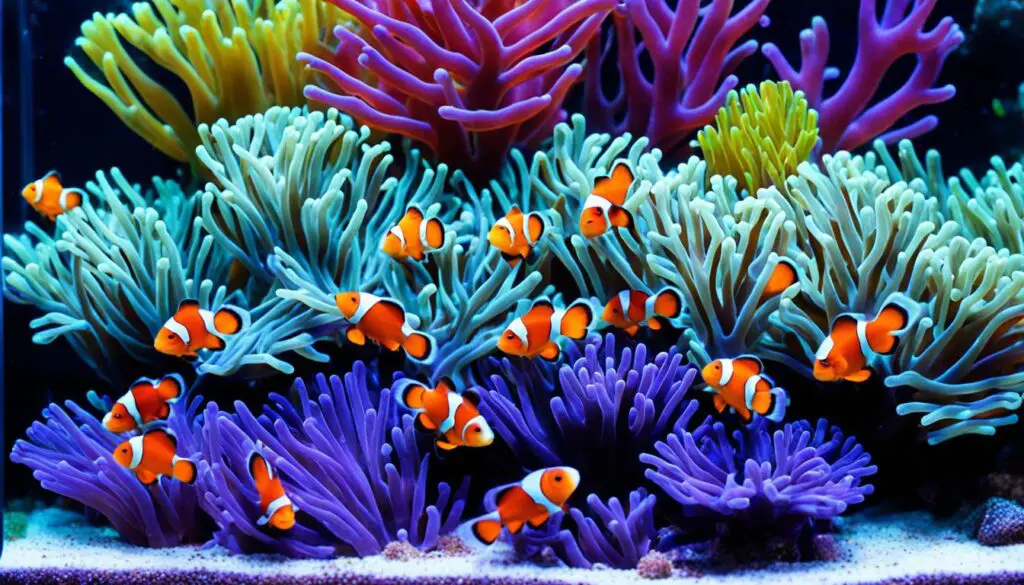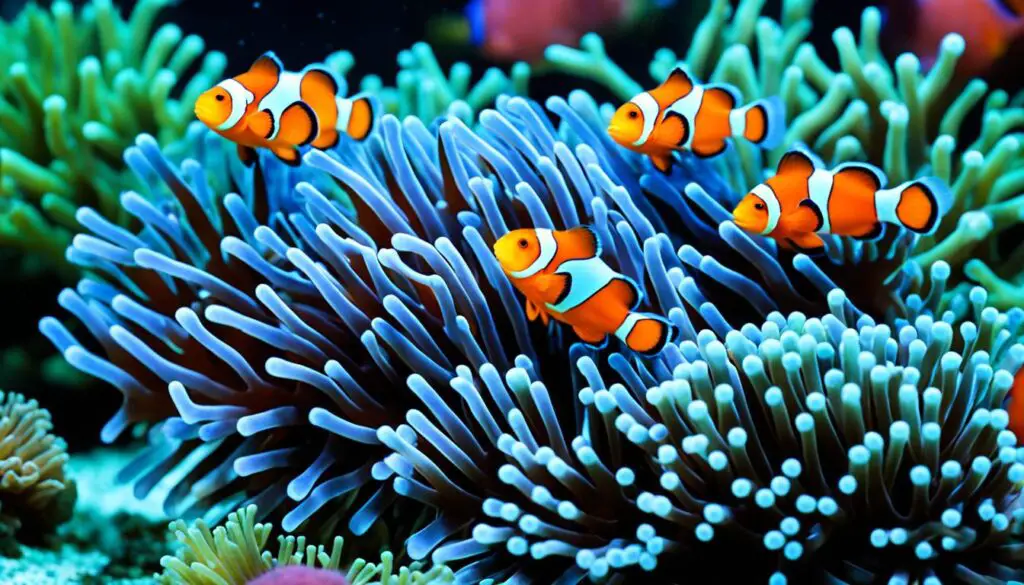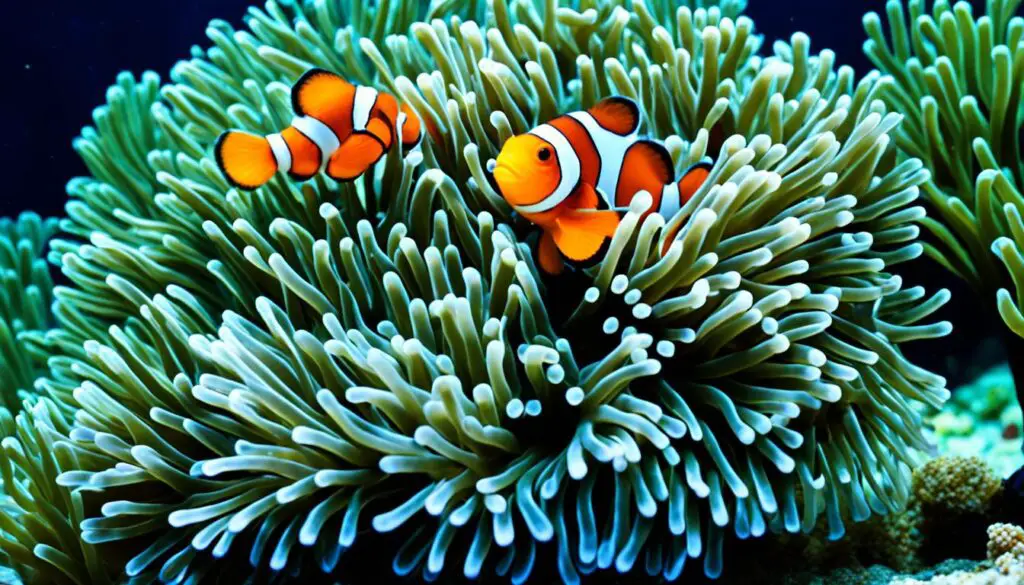Dealing with Clownfish Tank Stress: Expert Solutions
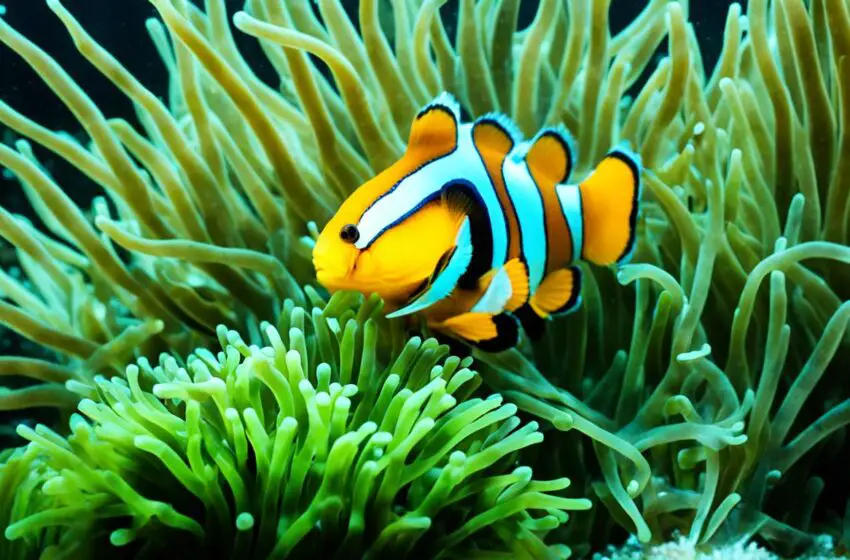
Clownfish tank stress can seriously affect your young clownfish’s health. Knowing why they get stressed and spotting the signs is vital to help them. This way, you can make them feel better.
According to Hemdal’s research in 2019, checking fish’s breathing can show their stress. It’s key to watch how fast or slow they breathe. This helps catch problems like Amyloodinium early.
Dealing with Amyloodinium calls for serious steps. You might need to use copper sulfate for 14 days or chloroquine for a month. But remember, these can’t happen if there are invertebrates in the tank.
Key Takeaways:
- Clownfish tank stress can have negative effects on the health and well-being of juvenile clownfish.
- Monitoring fish respiration rates can help determine their stress levels and diagnose common diseases like Amyloodinium.
- Treatments for Amyloodinium include copper sulfate or chloroquine, but cannot be performed with invertebrates present in the tank.
Understanding the Causes of Clownfish Tank Stress
To keep your clownfish healthy in a tank, it’s key to know what stresses them. Things like bad capture methods and too many fish in small spaces can stress them out. This stress can harm their health and happiness.
Poor Capture and Transportation Methods
Capturing and moving clownfish badly can really stress them. For example, using cyanide or putting too many fish in small spaces is harmful. They face tough times before they live in your tank, making it harder for them to adjust.
“It’s crucial to inquire about the length of time a fish has spent at the store before purchasing.”
When you’re buying clownfish, ask about their past and how they came to the store. Watching how they act and if they eat gives clues on their stress. This helps you pick healthily fish.
Fear and Inadequate Acclimation
Changing to a new tank is scary for clownfish. To make it easier for them, dim the lights and feed them when you’re not around. This helps them get used to their new home without too much stress.
Gradual acclimation is important too. By slowly adjusting the tank water to match the fish’s, you decrease their shock. This method helps them transition smoothly.
Other Potential Causes of Stress
There are more things that can stress clownfish out:
- Room conditions: Too much noise or sudden changes in light and temperature can scare them.
- Water quality issues: Bad water and imbalanced chemicals cause stress. Test the water often and do regular changes to keep it good.
- Disease: Clownfish can get sick, which is very stressful. Treating diseases fast is important.
- Nutrition: Food that’s not right or enough weakens their immune system. Feed them a varied diet to keep them strong.
- Incompatible tank mates: Bullying or fighting from other fish is a big stress. Choose fish that get along well.
By knowing and fixing these stressors, your tank becomes a happy home for your clownfish.
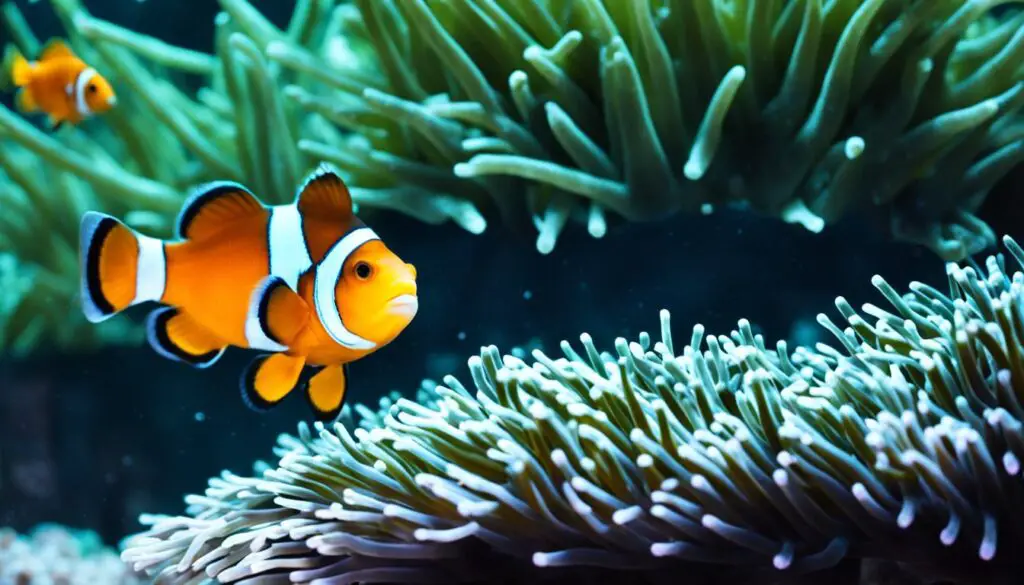
Benefits of Aquarium Therapy for Clownfish Tank Juveniles
Watching fish, like clownfish, is good for both your body and mind. This idea is called aquarium therapy. It uses the calming effect of fish-watching to help with issues like anxiety, depression, and high blood pressure.
Research shows that aquarium therapy can drop your heart rate by up to 3% in just 10 minutes. It can also lower your blood pressure and relax your muscles. This helps you feel happier and calmer just by watching the fish swim around.
Aquarium therapy isn’t a standard treatment yet, but it’s becoming more popular. It’s seen as a possible aid for different health problems. By creating a soothing atmosphere, it naturally helps with both your physical and mental health.
FAQ
What are the common causes of stress in clownfish tanks?
Clownfish tanks can stress fish due to poor capture and travel methods. New, scary environments and water quality issues also add stress. Disease, poor nutrition, and forcing fish to live with bad tank mates are key problems.
How can I alleviate stress in my clownfish tank?
To relax your fish, check the history of the fish before you buy. Keep an eye on how they act and eat. Turn on the tank lights slowly after they’re in. Feed them in private spots. Adjust them slowly to their new home. Make sure the room is right and pick the best tank pals. This will help them feel at home and healthy.
What is aquarium therapy and how can it benefit clownfish tank juveniles?
Aquarium therapy uses the calming effect of watching fish to help with health issues like stress, depression, and high blood pressure. For young clownfish, it can slow their heart rate and relax their body. This boosts their mood and makes them more chill and happy.

